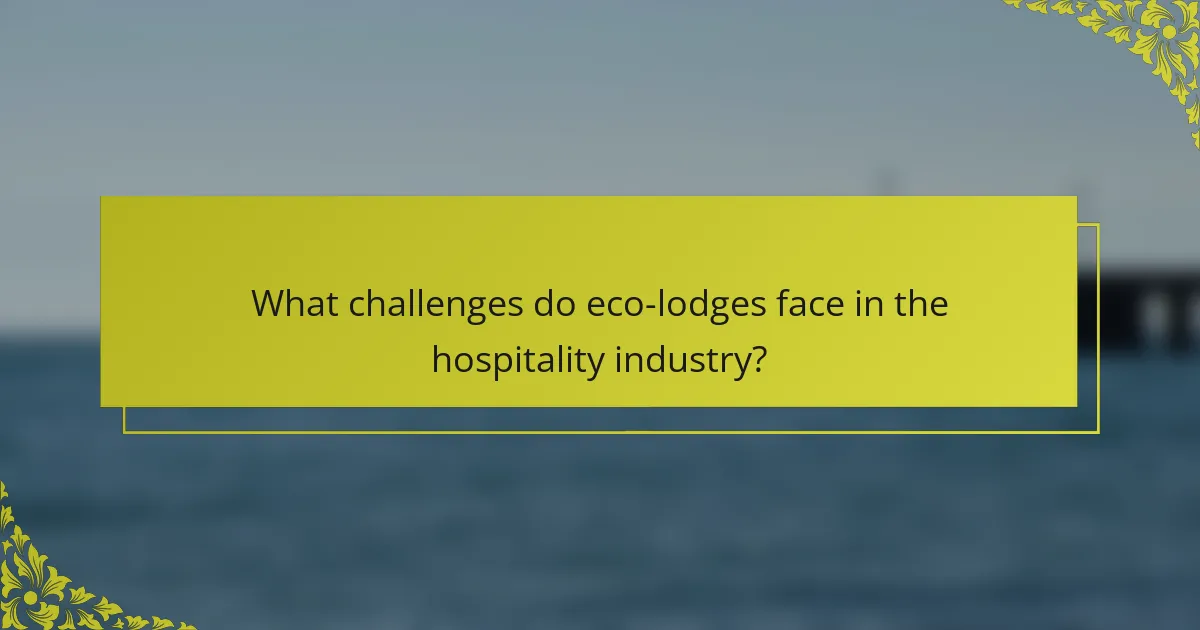Eco-lodges offer travelers sustainable experiences that prioritize environmental conservation and support local communities. They feature eco-friendly designs, renewable energy sources, and authentic cultural exchanges. These accommodations also face challenges like high operational costs and competition from conventional hotels. Understanding their unique attributes and future trends can help travelers make informed choices for eco-conscious stays.

What are the core benefits of staying in eco-lodges?
Staying in eco-lodges offers numerous benefits for travelers seeking sustainable experiences. These accommodations typically prioritize environmental conservation, support local communities, and provide unique immersive experiences in nature.
Eco-lodges often utilize renewable energy sources, reducing carbon footprints. They emphasize local food sourcing, which supports regional economies and promotes healthier dining options. Many eco-lodges engage in conservation efforts, such as wildlife protection and habitat restoration, enhancing the natural environment.
Travelers in eco-lodges frequently enjoy authentic cultural exchanges, connecting with local traditions and practices. This fosters a deeper appreciation for the destination and its people. Additionally, eco-lodges often feature eco-friendly amenities and designs, enhancing guest comfort while minimizing environmental impact.
Overall, eco-lodges represent a holistic approach to travel, combining comfort, sustainability, and cultural enrichment for a rewarding experience.
How do eco-lodges contribute to environmental sustainability?
Eco-lodges significantly contribute to environmental sustainability through eco-friendly practices and conservation efforts. They often utilize renewable energy sources, such as solar or wind power, reducing carbon footprints. Many eco-lodges implement water conservation techniques, like rainwater harvesting and low-flow fixtures, to minimize water usage.
They promote local biodiversity by incorporating native plants in landscaping and supporting wildlife conservation initiatives. Eco-lodges frequently engage with local communities, fostering sustainable tourism that benefits both the environment and local economies. This holistic approach ensures that travelers can enjoy nature while supporting its preservation.
What health benefits do travelers experience in eco-lodges?
Travelers experience numerous health benefits in eco-lodges, including reduced stress, improved mental well-being, and enhanced physical health. Immersing in nature promotes relaxation and mindfulness, which can lower anxiety levels. Eco-lodges often provide organic, locally sourced meals that contribute to better nutrition. Additionally, engaging in outdoor activities like hiking and yoga supports physical fitness. The unique attribute of eco-lodges is their commitment to sustainability, which fosters a sense of connection to the environment and enhances overall well-being.
Why do travelers prefer eco-lodges over traditional accommodations?
Travelers prefer eco-lodges due to their sustainable practices, unique experiences, and connection to nature. Eco-lodges often utilize renewable resources, reducing environmental impact. They provide authentic local experiences that traditional accommodations may lack. Additionally, eco-lodges frequently support local communities, enhancing the traveler’s sense of purpose. The combination of comfort and environmental consciousness appeals to modern travelers seeking meaningful stays.

Which features define a quality eco-lodge?
Quality eco-lodges are defined by their commitment to sustainability, unique design, and integration with nature. Key features include eco-friendly construction materials, renewable energy sources, and water conservation systems. Additionally, they often support local communities through employment and sourcing. Many offer immersive experiences that connect guests with the surrounding environment, enhancing both enjoyment and awareness of ecological issues.
What sustainable practices are commonly implemented in eco-lodges?
Eco-lodges commonly implement sustainable practices such as renewable energy use, water conservation, waste management, and local sourcing. These practices minimize environmental impact while enhancing guest experiences.
Renewable energy sources like solar panels reduce reliance on fossil fuels. Water conservation techniques, including rainwater harvesting, help preserve local water resources. Effective waste management systems promote recycling and composting. Sourcing food and materials from local suppliers supports the community and reduces carbon footprints.
These practices not only benefit the environment but also attract eco-conscious travelers seeking unique experiences.
How do eco-lodges integrate local culture and community?
Eco-lodges integrate local culture and community by promoting authentic experiences and supporting local economies. They often collaborate with local artisans and guides, offering guests immersive cultural activities. This fosters respect for traditions while enhancing travelers’ understanding of the area. Additionally, eco-lodges frequently source food and materials locally, strengthening community ties and ensuring sustainability.
What amenities can travelers expect in eco-lodges?
Travelers can expect eco-lodges to offer sustainable amenities like organic meals, renewable energy sources, and nature-based activities. Many eco-lodges feature locally sourced materials, water conservation systems, and community engagement initiatives. These attributes enhance the travel experience while promoting environmental responsibility. Unique offerings may include guided eco-tours and wildlife observation opportunities.

How do eco-lodges vary across different regions?
Eco-lodges vary significantly across regions due to local environmental conditions, cultural practices, and sustainability initiatives. For example, tropical eco-lodges often emphasize biodiversity conservation, while alpine eco-lodges focus on winter sports and energy efficiency. Each region showcases unique attributes, such as local architecture and native materials, enhancing the traveler’s experience. Additionally, the integration of community-based practices can differ, impacting local economies and social structures.
What unique eco-lodge experiences are available in specific countries?
Unique eco-lodge experiences vary by country, offering travelers distinctive interactions with nature and local cultures. In Costa Rica, lodges like Lapa Rios provide immersive rainforest experiences and wildlife watching. In New Zealand, EcoScape offers stunning views and eco-friendly accommodations in remote locations. Sweden’s Treehotel features unique treehouse designs, blending luxury with nature. In Madagascar, Anjajavy le Lodge allows guests to explore unique biodiversity while supporting conservation efforts. In Canada, Clayoquot Wilderness Resort combines luxury camping with adventure activities in pristine wilderness. Each eco-lodge emphasizes sustainability and community engagement, enhancing the travel experience.
How do eco-lodges adapt to local climates and environments?
Eco-lodges adapt to local climates and environments by utilizing sustainable building materials and energy-efficient designs. They often incorporate local flora and fauna into their landscaping, enhancing biodiversity. Many eco-lodges implement rainwater harvesting and solar energy systems, reducing their environmental footprint. Additionally, they engage with local communities to ensure practices align with cultural and ecological contexts. This unique approach not only supports sustainability but also enriches the traveler’s experience by fostering a deeper connection to the local ecosystem.

What challenges do eco-lodges face in the hospitality industry?
Eco-lodges face various challenges in the hospitality industry, including high operational costs, limited market awareness, and regulatory hurdles. These establishments often struggle with sourcing sustainable materials and managing waste effectively. Additionally, competition from conventional hotels can overshadow their unique offerings. Eco-lodges must also educate travelers on the benefits of sustainable practices, which can be a barrier to attracting guests.
How do eco-lodges address potential negative impacts on local ecosystems?
Eco-lodges address potential negative impacts on local ecosystems through sustainable practices and community engagement. They implement strategies like minimizing waste, using renewable energy, and sourcing local materials. Many eco-lodges conduct environmental impact assessments to identify and mitigate risks. They also educate guests on local ecology, fostering respect for the environment. By collaborating with local communities, eco-lodges enhance conservation efforts and promote biodiversity. These practices not only protect ecosystems but also support local economies.
What are the common misconceptions about eco-lodges?
Many misconceptions about eco-lodges stem from misunderstandings of their sustainability and luxury. Some travelers believe eco-lodges compromise comfort for environmental benefits, which is false; many offer high-end amenities while prioritizing eco-friendly practices. Another common myth is that eco-lodges are only for hardcore environmentalists, whereas they cater to all travelers seeking unique experiences. Additionally, some think eco-lodges are prohibitively expensive, though many options are budget-friendly. Lastly, there is a belief that eco-lodges lack authenticity, but they often provide genuine cultural experiences that connect guests with local communities.

How can travelers choose the right eco-lodge for their needs?
Travelers can choose the right eco-lodge by assessing their priorities in sustainability, comfort, and location. Start by identifying eco-lodges that prioritize renewable energy and waste reduction. Look for accommodations that offer local organic food and support community initiatives. Research the lodge’s certifications, such as LEED or Green Globe, to ensure they adhere to recognized sustainable practices. Finally, read reviews to gauge guest experiences related to environmental impact and service quality.
What criteria should be considered when selecting an eco-lodge?
When selecting an eco-lodge, consider sustainability practices, location, amenities, and community impact. Prioritize eco-certifications to ensure environmental responsibility. Evaluate the lodge’s energy sources, waste management, and water conservation efforts. Assess the local community’s involvement and benefits from the lodge’s operations.
How do travelers evaluate the authenticity of eco-lodges?
Travelers evaluate the authenticity of eco-lodges by assessing their sustainable practices, local community involvement, and environmental impact. Key indicators include certifications, guest reviews, and transparency about sourcing materials. Authentic eco-lodges prioritize eco-friendly designs and support local economies. Engaging with staff and exploring the lodge’s initiatives can also provide insights into their genuine commitment to sustainability.

What are the future trends in eco-lodge development?
Future trends in eco-lodge development focus on enhanced sustainability, technology integration, and community engagement. Eco-lodges will increasingly utilize renewable energy sources and eco-friendly materials. Smart technologies will improve guest experiences while minimizing resource consumption. Additionally, partnerships with local communities will foster cultural exchange and support local economies.
How is technology influencing eco-lodge sustainability efforts?
Technology significantly enhances eco-lodge sustainability efforts by optimizing resource management and reducing environmental impact. Smart energy systems, such as solar panels and energy-efficient appliances, lower energy consumption. Advanced waste management technologies improve recycling and composting practices. Additionally, digital platforms facilitate eco-friendly travel planning and promote local conservation initiatives. These innovations collectively contribute to a more sustainable lodging experience for travelers.
What innovations are emerging in eco-lodge design and architecture?
Innovations in eco-lodge design focus on sustainability, energy efficiency, and integration with nature. These include the use of renewable materials, such as bamboo and reclaimed wood, and advanced energy systems like solar panels and rainwater harvesting. Biophilic design principles enhance guest experiences by connecting indoor spaces with the natural environment. Smart technology is increasingly utilized for energy management, reducing waste and improving guest comfort. Additionally, modular construction methods are gaining traction, allowing for flexible designs that minimize environmental impact.
What practical tips can travelers follow to enhance their eco-lodge experience?
To enhance your eco-lodge experience, prioritize sustainable practices and local engagement. Choose eco-friendly accommodations that emphasize energy efficiency, waste reduction, and local sourcing. Participate in community activities to learn about local culture and conservation efforts. Use reusable items to minimize waste and support local businesses for meals and souvenirs. Respect nature by following trails and wildlife guidelines to preserve the environment.




